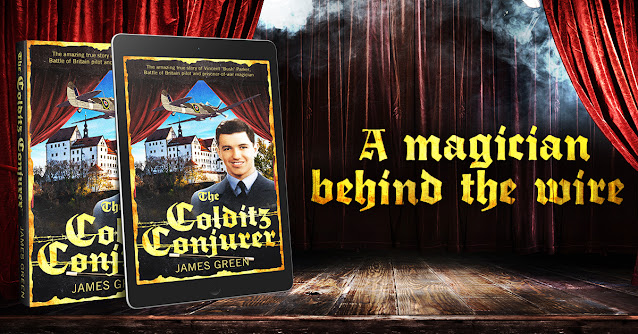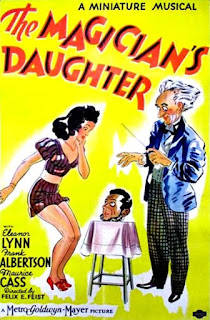Lionel King: The King of Cards conjures with ENSA
During World War Two, Lionel King (real name Lionel Klimsch) was one of hundreds of magicians employed by national governments to entertain sailors, soldiers and airmen.
When the war started, not all men and women were required to join the armed forces. Some were too young or too old, in reserved occupations, or failed the medical standards. King was too old to be conscripted. Instead, he served in a different capacity, as an entertainer-in-uniform.
Born just before the start of the Twentieth Century, Lionel King was an established act in the British music halls by the onset of World War Two. A professional magician he was a long standing member of The Magic Circle. Billing himself as ‘The King of Cards,’ or ‘Joker-Ace High,’ he earned a living with an act which used just a pack of playing cards and his personality to entertain the audience. His act was the epitome of ‘pack small, play big.’
In Card Tricks Without Skill, a post-war compilation of card tricks, editor Paul Clive described King's performing style and career:
“LIONEL KING: A professional performer of great ability, he specialises in card work... You cannot be in his company many minutes before becoming alive to his drive and personality; qualities which have helped him to reach the heights. He has that invaluable flair for making immediate friends with his audience.
“A seasoned entertainer, with no fewer than eight Royal performances to his credit, in addition to showing before the Kings of Norway, Spain and Portugal, he is a showman of the highest order, and an undoubted asset to the magical fraternity.”
Pre-war, King toured for several seasons with the Bouquets Concert Party. We can find descriptions of his act in George Johnson's The Magic Wand and Magigram magic magazines.
“Having obtained the assistance of three gentlemen, Lionel King introduces his act by stating that in view of subsequent happenings the audience might imagine that he used a fake pack of cards. He assured them it was an ordinary pack containing no duplicates, long or shorts, thick or thin cards, neither were they marked upon the backs.
“His act would start with ‘please take a card’ to be followed immediately by ‘no, not the Six of Diamonds (or whatever)’ which he would take from the volunteer helper, place on top of the pack, and ask the volunteer to take another card. Yes, you've guessed it, the volunteer would again get the Six of Diamonds. The Six of Diamonds would be given to the other volunteer to hold and again it would be the card selected by volunteer one while volunteer two would find himself holding an indifferent card. These or similar ploys followed a number of times.”
King's ability to force cards on spectators (including where he held the pack behind his back) was legendary. Clive called it, “a lesson in nerve and perfection.”
Other effects included ‘Cards to Pocket’ and ‘Three Cards Across.’ The cardician often finished with a dramatic version of ‘Blindfold Stabbing,’ where he found a chosen card among the shuffled deck spread out on a table and covered with a sheet of newspaper. Blindfolded, King would stab through the newspaper with a knife. The chosen card would be pierced by the knife.
Other times, he finished with a three-handed game of Nap (or Napoleon), a magical-version of a popular British card game.
“His Nap Hand is entrancing, whilst his charm and manner of presentation, stamp him as one of the foremost Card Conjurers of today,” reported Clive.
Aside from performing his magic act, King took part in sketches and other parts of the concert party's show, including a solo singing spot.
The Bouquets Concert Party regularly toured the country and achieved reasonable success. On 15 September 1934, the troupe gave a performance at The Spa Theatre, Scarborough. BBC Radio broadcast the show live.
Lewisham Hippodrome theatre flyer featuring Lionel King (1946)
(Source: PicUK)
Among his other skills, King was an artist and produced many sketches and paintings of other magicians and entertainers. He also did a lightning humooruous cartoon act.
When war came, Lionel King joined the Entertainments National Service Association, or ENSA for short. This was a wartime organisation established to entertain the British armed forces, at home and abroad. Entertainers of all forms were formed into touring concert parties and dispatched to perform in venues as diverse as munition factory canteens, air-raid shelters, anti-aircraft sites, supply depots and even front-line positions.
As part of his ENSA duties, King performed at The Empire in Kingston-on-Thames, which was a convalescent depot for injured military personnel.
Lionel King’s billing on a Leeds Empire promotional flyer (1952)
(Source: Leeds Empire)
After the war, King continued to perform his act in variety theatres until these went into terminal decline in the 1950s.
Related article: ‘Fake Chinese pickpocket magician a hit with frontline troops.’ An account of Bertram Otto's wartime tours with ENSA, where he performed as Ming Chow. Blog link.
Related article: ‘Magician leads ENSA company through a firefight with Japanese troops...and survives.’ Magician Oswald Rae's adventures with ENSA in the Far East. Blog link.
Related article: ‘Verdini: Czech magician escapes Nazi blitzkrieg three times, fights in the Battle of Britain...and joins ENSA,’ tells the story of a Czech magician's extraordinary wartime escape from Czechoslovakia, to France, and to England, before he joined ENSA and headed overseas again. Blog link.
Related article: ‘Verdini: Czech magician escapes Nazi blitzkrieg three times, fights in the Battle of Britain...and joins ENSA,’ tells the story of a Czech magician's extraordinary wartime escape from Czechoslovakia, to France, and to England, before he joined ENSA and headed overseas again. Blog link.
*** AVAILABLE NOW ***
The Colditz Conjurer tells the amazing true story of Flight Lieutenant Vincent ‘Bush’ Parker, Battle of Britain pilot and prisoner-of-war magician.
Written by the Magic at War team, The Colditz Conjurer is a remarkable tale of perseverance, courage and cunning in the face of adversity. It features over 55 original photographs and maps. 126 pages.













Comments
Post a Comment